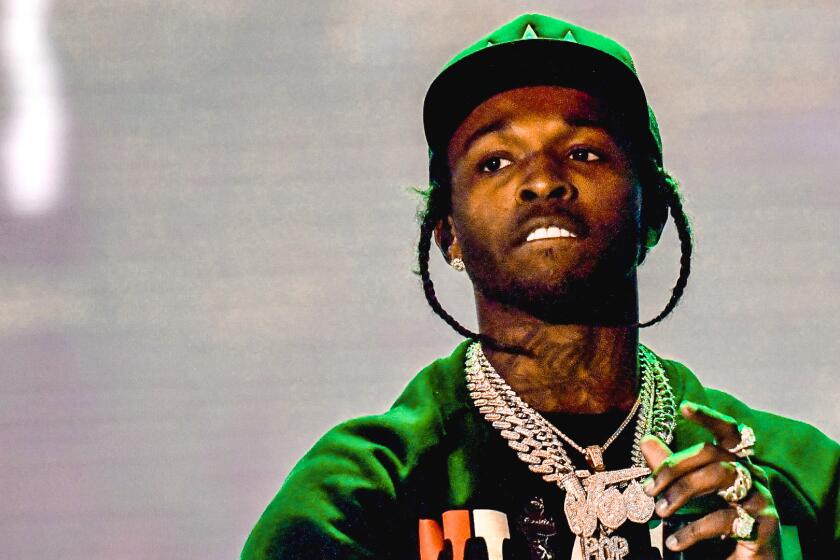Jazz has lost its voice
- Share via
One would be hard-pressed to find a hipper night school than Chuck Niles’ drive-time lessons in jazz. With his passing Monday night at the age of 76, Southern California has sadly lost its premier master class and its peerless professor.
The voice of jazz on L.A. radio airwaves for more than 40 years, “Bebop Charlie” was more than an announcer or DJ; he was a time capsule, our well-thumbed encyclopedia. Mostly, though, he was the A-list insider with the passkey into the vibrant world of straight-ahead jazz.
Niles lived a 24-hour jazz life. You could hear it in his late-night basement baritone; see it in his tireless crosstown club-crawling. You always knew you were at the spot if you’d swivel around and catch Niles -- all 6 feet 4 of him -- slipping onto a barstool to check out the tail end of a late set, doing what he did best: circulating.
From sound booths at KNOB in the late ‘50s, then KBCA (later KKGO) and KLON, now KKJZ, Niles tutored hundreds of thousands of listeners on the finer points of classic jazz. To be sure, he had areas of interest: bebop, Ellington, Sarah Vaughan, Phil Woods. Sometimes his leanings would show, and he’d try his best to catch himself, mid-set, to “ease off the Sass and Duke.”
“He really did a job here,” says saxophonist/clarinetist Buddy Collette, who shared many a stage with Niles over the space of 30-plus years. Both were engaged in what many outsiders thought was an oxymoronic practice -- promoting jazz in Los Angeles. “He got inside it because he really understood the beats and pace of the city,” Collette says.
Niles got inside the music, and in turn the music got inside the heads of so many Angelenos. “The reason that he was able to open people up to jazz so readily was the way he talked about it,” says Jazz Bakery proprietor Ruth Price. “It was, ‘This cat can really blow!’ When Chuck talked about it, anyone could understand it.”
Indeed, no one on local radio spoke like Chuck Niles. That Pall Mall-grooved voice, that vintage “platter patter,” was as distinctive as an instrument. That purring “yeaaahhhh” at cut’s end was recognizable in an instant.
Growing up in L.A., I can’t remember a moment when Chuck Niles wasn’t somewhere on the dial. My jazz education started with Niles at KBCA, his after-hours voice diagraming the West Coast sound, working through the formulas of Latin jazz, tracing the bebop family tree: bop, hard bop, post-bop and beyond. It always sounded like he was knocking around alone in a room in a place where it was always nighttime.
“He had this way of talking about each individual player in a session,” KKJZ DJ Helen Borgers says. “He would back-announce a tune, quickly and concisely, giving details about that particular session, all the sidemen, a particular musician -- ‘That’s a really good little timekeeper from Philadelphia.’ ... It was inclusive, not exclusive.”
His show was always a bit improvised, like the music itself. A Chuck Niles set was as much about connections as it was moods, digressions about the weather or his need to pick out a long-enough cut so he could grab a cigarette.
L.A.’s jazz scene had every reason to think that Niles would always be there because he always was: at this ribbon-cutting or cocktail party; at this banquet in schools.
“People would say, well, Chuck has to be there. He makes it special,” Collette says. “So he had to go. Even if he was tired, he’d go.” Retirement was never a question: “You always got the feeling he was just going to hang until the time ran out.”
That constant presence spoke volumes. “He was always there for us,” says guitarist and educator Kenny Burrell. “I was there when they gave him his star on the Walk of Fame. And I don’t know if it says ‘the Dean of Jazz.’ But if it doesn’t, it should”
As radio becomes more bland and standardized coast-to-coast, our ears have become less used to radio that reflects a region or encourages personality. Given that, I can’t imagine what my understanding of jazz would be without Niles’ idiosyncratic influence -- his meanderings down memory lane, his trotting out one-of-a kind morsels about Dexter Gordon, Carmen McRae or Poncho Sanchez, making the history of jazz come alive, indelible before our ears.
While we ponder the plight of jazz studies, we might as well add the question: What will become of our jazz IQ without Chuck Niles?
More to Read
The biggest entertainment stories
Get our big stories about Hollywood, film, television, music, arts, culture and more right in your inbox as soon as they publish.
You may occasionally receive promotional content from the Los Angeles Times.










